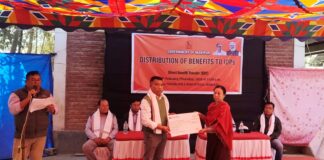New Delhi: India and Australia on Saturday emphasised that Afghanistan must not allow its soil to be used in any manner by anybody for terrorism, following a meeting of their defence and foreign ministers here.
Afghanistan was “a major subject of discussion” between External Affairs Minister S. Jaishankar and Australian Foreign Minister Marise Payne, along with their defence ministers – Rajnath Singh from India and Peter Dutton from Australia, at the inaugural India-Australia 2+2 dialogue.
Both sides had a very detailed exchange of views and “our approach is very similar”, said EAM Jaishankar, adding that it is in a way summed up by the United Nations Security Council resolution on Afghanistan 2593, adopted on August 30 during India’s presidency, “which emphasises most of all that Afghanistan must not allow its soil to be used in any manner by anybody for terrorism”.
He said there were also “issues of concern about the inclusiveness of the dispensation, concerns about the treatment of women and minorities, matters related to travel, and of humanitarian assistance”.
The remarks come days after the Taliban announced a caretaker government in Kabul, in which 17 of the 33 members figure on the UN Sanctions List. The caretaker cabinet also does not have any women, or representation from the various ethnic communities.
“So it is an evolving situation, and we had a good exchange of notes,” said Jaishankar.
Payne said that both sides “share a very strong interest in ensuring that Afghanistan never again becomes a safe haven for the breeding or the training of terrorists, and that is the abiding concern of the international community.”
She said Australia is also focused on seeking safe passage for those in Afghanistan, citizens, foreign nationals, “those who seek to leave Afghanistan and we have urged that they be allowed to leave safely and means are available for them to do so”.
“We are very conscious of the impact of violence and breaches of human rights on the Afghan community and again would call for those fundamental human rights to be observed, humanitarian assistance will be a strong focus for the international community,” she added.
Payne, who is also Minister for Women, said: “We would also strongly reinforce Australia’s views in relations to the position of women and girls, for 20 years we have worked with the international community and the people of Afghanistan to ensure that the circumstances for women and girls in relation to education, participation in the workforce, the protection of their basic rights were preserved and in fact allowed to grow.”
She said there are many women and girls “who attest to the achievements of those two decades, and Australia stands with other members of the international community in seeking to ensure that is not wound back.”


